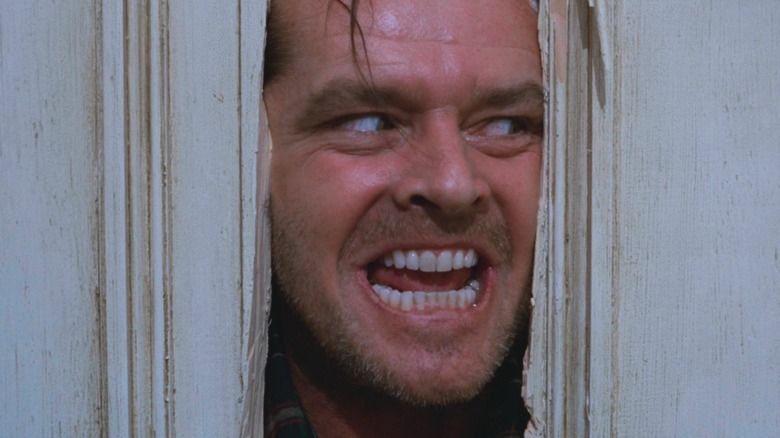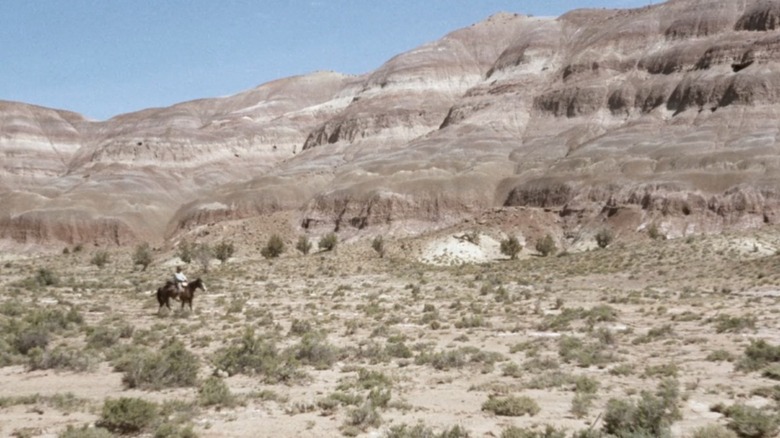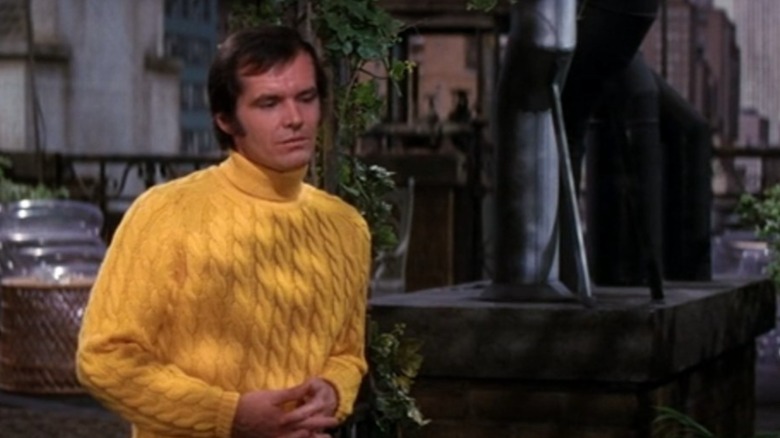There Are Two Perfect Jack Nicholson Movies, According To Rotten Tomatoes (And They're Not What You'd Expect)
What's the best Jack Nicholson movie? Ask a group of film fans, and you'll likely get a half-dozen different answers. The actor's most historically significant movie may be "Chinatown," the sun-baked California noir from 1974 that earned 11 Oscar nominations and a permanent spot in the American Library of Congress' National Film Registry. Or it might be "One Flew Over the Cuckoo's Nest," the beloved adaptation of Ken Kesey's novel that swept the Oscars in 1975 and turned the already-popular Nicholson into Hollywood's hottest commodity.
The actor's most popular films according to Letterboxd users are Stanley Kubrick's horror masterpiece "The Shining" and Martin Scorsese's crime saga "The Departed." His highest-grossing role at the box office came in 1989, when Tim Burton cast him as the rictus-grin supervillain The Joker in "Batman." Other popular moneymakers featuring the veteran performer include James L. Brooks' "As Good As It Gets," Nancy Meyers' "Something's Gotta Give," and Rob Reiner's "A Few Good Men." Nicholson knows the key to success and longevity: he doesn't just put in phenomenal performances, but he also works with talented, carefully-chosen directors. Plus, he's done a little something for everyone: if none of the above appeal to you, you might also consider the countercultural spirit of "Easy Rider," the cult classic pleasures of "The Witches of Eastwick" and "Mars Attacks!" or, hell, even the old guy charm of "The Bucket List."
Surprisingly, the only two films featuring the actor to ever earn a perfect 100% score on critical aggregate Rotten Tomatoes are not among the standouts listed above. In fact, you may have never heard of them.
Nicholson played the villain in an 'existential Western'
Both of the Nicholson films that every surveyed critic wrote positively about were released early in his career, before nearly all of the movies listed above. The first, "The Shooting," is a 1966 Western movie directed by "Two-Lane Blacktop" filmmaker Monte Hellman. The film follows a former bounty hunter (Warren Oates) and his not-so-bright sidekick Coley (Will Hutchins) as they travel across the desert with a mysterious woman (Millie Perkins), a lone gunman dressed in black on their trail. The gunman in question was played by Nicholson, who by that point had appeared in movies like "Little Shop of Horrors" and "The Raven," but who hadn't yet broken through with "Easy Rider."
According to the biography "Jack's Life," by Patrick McGilligan, Nicholson worked as a producer on the film and brought the print of it to Paris to strike up a distribution deal. While the movie was a hit when screened for the crowd of movie buffs influenced by Cahier du Cinema and made an appearance on the Cannes open market, the distributors he eventually struck a deal with went bankrupt, effectively putting the movie in limbo. Hellman told Cashiers du Cinemart that the film was "held up in legal technicalities for three years," but it ultimately made its way to audiences, who were receptive.
While some Rotten Tomatoes scores end up skewed thanks to negative print reviews that have gotten lost in the ether over the years (see: Marilyn Monroe's highest-rated role), McGilligan writes that "The Shooting" earned praise from the jump. In a 1971 issue of "Sight & Sound," Philip Strick wrote that "Heilman a master in the art of putting his camera, quite unpredictably, in the right place at the right time," while Time Out's David Pirie called it "Probably the first Western which really deserves to be called existential." The film continues to impress today: in 2012, the New Yorker's Richard Brody wrote that the film "offers primal violence with a modernist chill," and that its ending is "as ingenious as it is mysterious."
The actor co-starred alongside Barbara Streisand in a 1970 musical
The other Nicholson movie with a perfect Rotten Tomatoes score provides an excellent contrast to "The Shooting." Released in 1970, "On a Clear Day You Can See Forever" is a musical starring Barbara Streisand as a psychic named Daisy who's trying to quit smoking. She undergoes hypnosis that allows her to access a supposed past life self, a 19th century seductress and blackmailer named Lady Melinda Winifred Waine Tentrees. Things get complicated when her psychiatrist (Yves Montand) falls in love with Lady Melinda.
Directed by "An American In Paris" and "Gigi" filmmaker Vincente Minnelli, "On a Clear Day You Can See Forever" is an adaptation of Alan Jay Lerner's musical of the same name, which earned several Tony nominations during its original Broadway run (Lerner also penned the film's script). Nicholson takes a smaller role in the zany, colorful story compared to his man in black character in the "The Shooting." Here, he plays Tad, a man who appears in Daisy's life late in the film and treats her better than her other love interests. According to his aforementioned biography, his role was ultimately trimmed down and his song cut entirely.
Though there seem to have been some mixed reviews for the film upon its initial release (an archived Time Out London review criticizes the script's "length and shallowness"), only 10 write-ups are preserved on Rotten Tomatoes today, and they all take a positive review of the modest hit. Upon release, Vincent Canby reported to the New York Times that this was "a movie of fits and starts, but because the fits are occasionally so lovely, and the starts somewhat more frequent than Fifth Avenue buses, I was eventually hypnotized into a state of benign though not-quite-abject permissiveness." It's not exactly a rave, sure, but it's enough to earn the movie a rare distinguishment: it remains one of the most unanimously critically adored in Nicholson's decades-long career.


